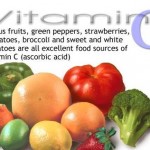 A 2009 study performed in rodents gives steroid users good evidence to include supplemental vitamin C in their diets. The study demonstrated the ability of vitamin C to prevent prostate growth caused by testosterone treatment. In practical terms, this could mean that testosterone using males have a better chance of not suffering prostate enlargement if they make sure to get enough vitamin C.
A 2009 study performed in rodents gives steroid users good evidence to include supplemental vitamin C in their diets. The study demonstrated the ability of vitamin C to prevent prostate growth caused by testosterone treatment. In practical terms, this could mean that testosterone using males have a better chance of not suffering prostate enlargement if they make sure to get enough vitamin C.
J Nutr Biochem. 2009 Aug 26. [Epub ahead of print]
Vitamin C supplementation prevents testosterone-induced hyperplasia of rat prostate by down-regulating HIF-1alpha.Li SH, Ryu JH, Park SE, Cho YS, Park JW, Lee WJ, Chun YS.
Department of Pharmacology, Ischemic/Hypoxic Disease Institute, Seoul National University College of Medicine, Seoul 110-799, South Korea.
AbstractBenign prostatic hyperplasia (BPH) is a disease that impairs the well-being of many aged men. To alleviate BPH symptoms or to find a cure for this disease, key molecules should be identified that control prostate cell proliferation. Recently, HIF-1alpha has attracted attention in this context, because it is highly expressed in hyperplasic prostates and prevents prostate cell death. Thus, given that vitamin C inhibits HIF-1alpha expression in several malignant tumors, we examined its therapeutic potential in BPH. HIF-1alpha was noticeably induced by testosterone in prostate cells, and this HIF-1alpha induction was abolished by vitamin C. Vascular endothelial growth factor (VEGF) promoter activity reporter assays and semi-quantitative RT-PCR revealed that vitamin C inhibited HIF-1-dependent VEGF expression. Furthermore, HIF-1alpha suppression by vitamin C was rescued by knocking down HIF-prolyl hydroxylase-2, suggesting that vitamin C destabilizes HIF-1alpha via prolyl hydroxylation. Moreover, vitamin C treatment abolished cell proliferation induced by testosterone treatment to the control level. These results suggest that vitamin C inhibits testosterone-induced HIF-1alpha expression and by so doing effectively prevents prostate hyperplasia. In male rats, testosterone treatment for 4 weeks induced prostate hyperplasia. Furthermore, HIF-1alpha and VEGF levels were significantly elevated in hyperplasic prostates. In vitamin C-treated rats, however, most prostate hyperplasia parameters and prostrate HIF-1alpha/VEGF levels were markedly reduced. Accordingly, our findings indicate that vitamin C could be further developed clinically for use as an anti-BPH agent.
PMID: 19716283 [PubMed – as supplied by publisher]
